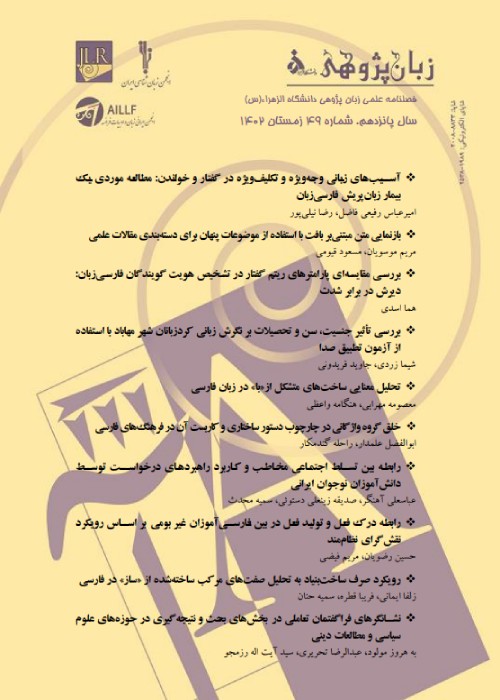Grammaticalization in Azerbaijani Turkish: A Case Study of Postpositions
Author(s):
Article Type:
Research/Original Article (دارای رتبه معتبر)
Abstract:
In one of dialects of Turkish, so called Azarbaijani, some postpositions not only have grammatical function but also serve as lexical categories in some contexts. There is an underlying assumtion that the mentioned postpositions are formed out of lexical items such as nouns and adjectives through grammaticalization. Grammaticalization is a process through which lexical items and constructions turn up in certain linguistic contexts to serve as grammatical functions, and, once grammaticalized, they continue to develop new grammatical functions. Forms do not shift abruptly from one category to another, but go through a series of small transitions, transitions that tend to be similar across languages. These transitions can be shown in a cline of grammaticality as follows (the overlapping stages of grammaticalization form a chain generally called a cline): content item> grammatical word> clitic > inflectional affix. Each item to the right is more grammatical but less lexical compared with its partner to the left. In this article some postpositions of Azerbaijani Turkish have been studied in corpus; the basis of analysis is grammaticalization framework introduced by Hopper. Hopper introduces five cross-linguistic principles that enable linguists to recognize grammaticalization cases in different languages without relying on historical data. These principles are as follows: 1) layering: within a broad functional domain, new layers are continually emerging; as this happens, the older layers are not necessarily discarded, but coexist and interact with new layers. 2) Divergence: when a lexical form undergoes grammaticalization to a clitic or affix, the original lexical form may remain as an autonomous element and undergo the same changes as ordinary lexical items. 3) Specialization: within a functional domain, at one stage a variety of forms with slight semantic differences might emerge; as grammaticalization takes place, this variety of form choices narrows and the fewer number of forms selected indicates more general grammatical meaning. 4) Persistence: When a form undergoes grammaticalization from a lexical to a grammatical function, so long as it is grammatically viable, some traces of its lexical meanings tend to adhere to it, but details of its lexical history might be reflected in constraints on its grammatical distribution. 5) De-categorialization: through the process of grammaticaliation, morphological markers as well as syntactic features (such as Noun or Verb) pertaining to some forms are either lost or neutralized; but instead the characteristics of secondary categories such as Adjective, Participle, Preposition, etc, are presumably attributed. As mentioned some postpositions in Azerbaijani Turkish along with their grammatical functions, are used as autonomous elements such as Noun or Adjective as well; according to our assumption this can be due to grammaticaliztion of these elements to postpositions. The purpose of the present research is to describe the validity of the above hypothesis by using the Hopper's grammaticalization principles. In this regard, we adopted a field-library method for collecting data. For studying postpositions in context, 100 sentences containing postpositions were extracted from Azari corpus which contains contemporary written texts. Then the samples of grammaticalization were analyzed applying Hopper`s principle. This paper deals with identifying and analyzing eight cases of grammaticalized postpositions including Ajrµ, kimi, sArµ, irQli, GArtSµ, doÄru, ytSyn, ilQ. Having studied the change process of these words in terms of the principles of grammaticalization, it was revealed that a number of proper postpositions are as the result of grammaticalization out of other categories such as nouns and adjectives. Some of postpositions have lost their primary role, while some of them in spite of accepting a new role as postposition, have retained their original role. It has been observed that in some cases these postpositions have lost their original lexical meaning, and in contemporary Turkish, they only have a grammatical function. The process followed by these words is justifiable by the principle of decategorization; according to this principle the basic categories lose their characteristics and take the characteristics of the secondary categories. In other cases, the lexical categories, while preserving their original lexical meaning, they also take the function of postposition as the result of grammaticalization. So it can also be explained by the principle of divergence. The divergence and decategorization of these cases show that the grammaticalization of these cases is still in the initial phase of grammaticalization (content item> grammatical word). For the case of ilQ,due to the deletion of instrumental case-marking -nin the contemporary Turkish, its function has been granted to ilQwhich is the consequene of the grammaticalization. This postposition also undergo the process of cliticalization which, with regard to the grammaticalization cline, can eventually be replaced with the old and abandoned case-marking suffix. Thus, in Azerbaijani Turkish, by means of grammaticalization, the required grammatical categories are reproduced; this process can be seen in 7 other cases that are still in the initial phase of grammaticalization.
Keywords:
Language:
Persian
Published:
Language research, Volume:10 Issue: 27, 2018
Pages:
69 to 89
https://magiran.com/p1873483
دانلود و مطالعه متن این مقاله با یکی از روشهای زیر امکان پذیر است:
اشتراک شخصی
با عضویت و پرداخت آنلاین حق اشتراک یکساله به مبلغ 1,390,000ريال میتوانید 70 عنوان مطلب دانلود کنید!
اشتراک سازمانی
به کتابخانه دانشگاه یا محل کار خود پیشنهاد کنید تا اشتراک سازمانی این پایگاه را برای دسترسی نامحدود همه کاربران به متن مطالب تهیه نمایند!
توجه!
- حق عضویت دریافتی صرف حمایت از نشریات عضو و نگهداری، تکمیل و توسعه مگیران میشود.
- پرداخت حق اشتراک و دانلود مقالات اجازه بازنشر آن در سایر رسانههای چاپی و دیجیتال را به کاربر نمیدهد.
In order to view content subscription is required
Personal subscription
Subscribe magiran.com for 70 € euros via PayPal and download 70 articles during a year.
Organization subscription
Please contact us to subscribe your university or library for unlimited access!


